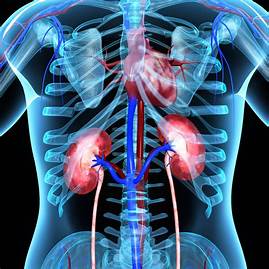Drinking Soda and Your Kidneys By Pierre Mouchette | Bits-n-Pieces Soda Effects on the Kidneys
Soft drinks are the single largest source of sugar and calories in the American diet. Most drinks contain 7 to 10 teaspoons of sugar per serving, more than the recommended daily intake. The American Heart Association states that women should not have more than six teaspoons of sugar daily, and men not to exceed nine teaspoons. Diet soda is not healthy, either. According to a 2017 study in the Clinical Journal of the American Society of Nephrology, diet drinks can enhance the risk of end-stage renal disease in the long run. Subjects reporting the highest diet soda consumption were likelier to develop this disorder, indicating a dose-response relationship. Additionally, these drinks may impair glucose metabolism, leading to diabetes. Dietary phosphorus, a primary ingredient in diet and standard sodas, may affect phosphorus levels in the bloodstream and increase the acid load. This factor alone could promote renal damage. In addition, diet soda may impair kidney function due to its effects on glucose metabolism. Sugar from soda or sweets may lead to insulin resistance, hypertension, and weight gain. Over time, those factors will impact kidney functions. Also, there seems to be a connection between cola sodas and the kidneys. Cola drinks contain phosphoric acid, which can harm individuals with polycystic kidney disease and other renal disorders. Soda Consumption and Kidney Stones Have you ever heard of the so-called "coke treatment" for kidney stones? This method is supposed to help dissolve kidney stones and prevent them from returning. Unfortunately, it is a myth and can do more harm than good. The University of Chicago advises against this practice stating that Coke and other soft drinks may cause or worsen kidney stones, while consuming two or more daily cans may lead to chronic kidney disease. An occasional coke or alcoholic drink is unlikely to cause any harm. However, both beverages may indirectly affect kidney function in the long run. Sugar in these drinks can increase blood pressure, which could lead to kidney failure, warns the American Heart Association. All told, plain water is the best choice. Some teas contain caffeine and may be unsafe for chronic kidney disease patients. The same goes for coffee. Conversely, water can reduce the risk of kidney stones and help to flush them out of your system. Harvard Health Publishing endorses drinking enough water to pass around 2 liters of urine daily. A low-sodium diet can also help, especially if you are predisposed to kidney stones. Small dietary changes could help prevent kidney stones and improve renal function. Try swapping animal protein for plant-based proteins like tofu, tempeh, chickpeas, and lentils.
0 Comments
Your comment will be posted after it is approved.
Leave a Reply. |
Archives
May 2024
|
